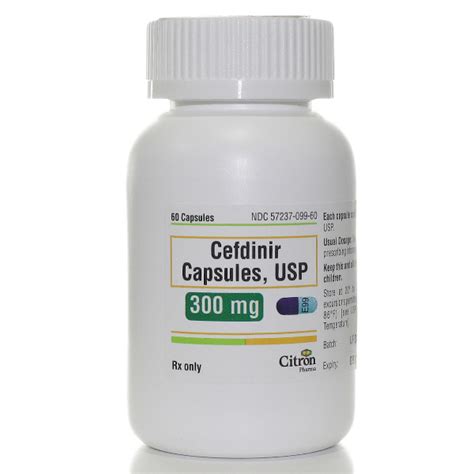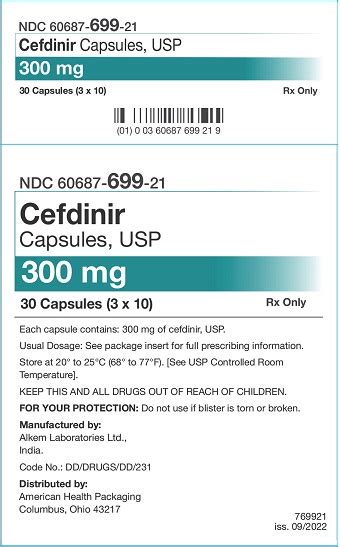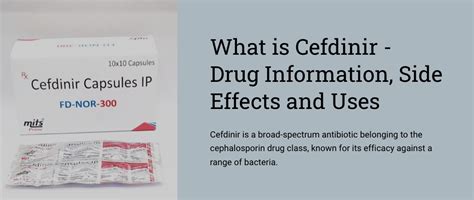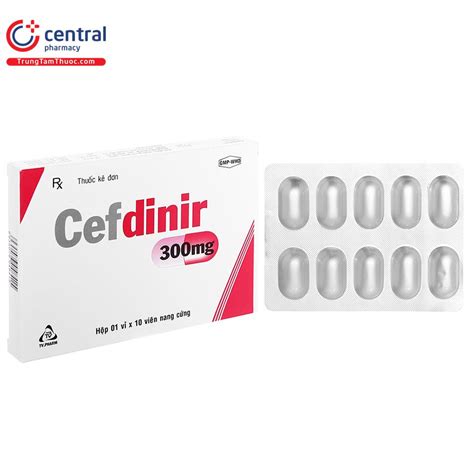Intro
Discover the uses, dosage, and side effects of Cefdinir 300mg Capsules, a broad-spectrum antibiotic. Learn how this medication treats bacterial infections, its recommended dosage for adults and children, and potential side effects such as diarrhea, nausea, and headache. Understand Cefdinirs mechanism of action, interactions, and warnings for a safe treatment.
Cefdinir 300mg capsules are an antibiotic medication used to treat various bacterial infections, including respiratory tract infections, skin infections, and urinary tract infections. Cefdinir belongs to a class of antibiotics known as cephalosporins, which work by stopping the growth of bacteria and ultimately leading to their death.
As a cephalosporin antibiotic, cefdinir is effective against a wide range of Gram-positive and Gram-negative bacteria, including Streptococcus pneumoniae, Haemophilus influenzae, and Moraxella catarrhalis. Cefdinir is often prescribed to treat conditions such as bronchitis, pneumonia, sinusitis, and tonsillitis. It is also used to treat skin infections, such as cellulitis and impetigo, and urinary tract infections, including pyelonephritis and cystitis.

Uses of Cefdinir 300mg Capsules
Cefdinir 300mg capsules are used to treat various bacterial infections, including:
- Respiratory tract infections: bronchitis, pneumonia, sinusitis, and tonsillitis
- Skin infections: cellulitis and impetigo
- Urinary tract infections: pyelonephritis and cystitis
- Other infections: otitis media, pharyngitis, and strep throat
Cefdinir is also used to treat bacterial infections in patients with chronic bronchitis and acute exacerbations of chronic bronchitis.
How Cefdinir Works
Cefdinir works by inhibiting the synthesis of bacterial cell walls, ultimately leading to the death of the bacteria. Cefdinir binds to penicillin-binding proteins (PBPs) located inside the bacterial cell wall, inhibiting the cross-linking of peptidoglycan chains. This results in a weakened bacterial cell wall and ultimately leads to the death of the bacteria.
Dosage of Cefdinir 300mg Capsules
The dosage of cefdinir 300mg capsules varies depending on the type and severity of the infection being treated. The recommended dosage is as follows:
- Adults: 300mg every 12 hours or 600mg every 24 hours for 5-10 days
- Children: 7mg/kg every 12 hours or 14mg/kg every 24 hours for 5-10 days
The maximum recommended dosage is 600mg every 24 hours.

Precautions and Contraindications
Before taking cefdinir 300mg capsules, patients should inform their doctor of any allergies, especially to cephalosporins or penicillins. Cefdinir is contraindicated in patients with a known allergy to cephalosporins or penicillins.
Cefdinir should be used with caution in patients with kidney or liver disease, as it may affect the kidneys or liver. Patients with a history of seizures or epilepsy should also use cefdinir with caution, as it may increase the risk of seizures.
Side Effects of Cefdinir 300mg Capsules
Common side effects of cefdinir 300mg capsules include:
- Diarrhea
- Nausea
- Vomiting
- Abdominal pain
- Headache
- Dizziness
- Fatigue
- Rash
Serious side effects of cefdinir include:
- Allergic reactions: anaphylaxis, angioedema, and Stevens-Johnson syndrome
- Seizures
- Kidney or liver damage
- Pseudomembranous colitis
Patients should seek medical attention immediately if they experience any serious side effects.

Interactions with Other Medications
Cefdinir 300mg capsules may interact with other medications, including:
- Antacids: may decrease the absorption of cefdinir
- Iron supplements: may decrease the absorption of cefdinir
- Probenecid: may increase the levels of cefdinir in the blood
- Warfarin: may increase the risk of bleeding
Patients should inform their doctor of all medications they are taking before starting cefdinir.
Conclusion
Cefdinir 300mg capsules are an effective antibiotic medication used to treat various bacterial infections. While cefdinir is generally well-tolerated, patients should be aware of the potential side effects and interactions with other medications. By following the recommended dosage and precautions, patients can safely and effectively treat their bacterial infections.

If you have any questions or concerns about cefdinir 300mg capsules, please comment below. Share this article with others who may be interested in learning more about cefdinir.
What is cefdinir used to treat?
+Cefdinir is used to treat various bacterial infections, including respiratory tract infections, skin infections, and urinary tract infections.
What is the recommended dosage of cefdinir?
+The recommended dosage of cefdinir is 300mg every 12 hours or 600mg every 24 hours for 5-10 days.
What are the common side effects of cefdinir?
+Common side effects of cefdinir include diarrhea, nausea, vomiting, abdominal pain, headache, dizziness, and fatigue.
Can cefdinir interact with other medications?
+Yes, cefdinir may interact with other medications, including antacids, iron supplements, probenecid, and warfarin.
